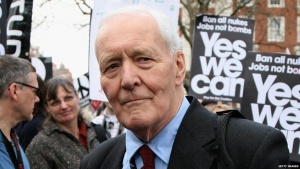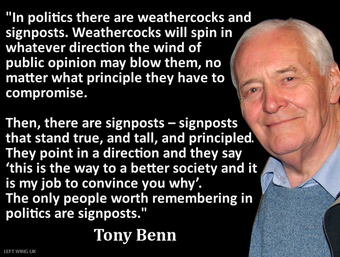Tony Benn
Anthony Neil Wedgwood Benn was a UK Labour Party politician who was a Member of Parliament (MP) for forty-seven years between 1950 and 2001 and a Cabinet minister under Harold Wilson and James Callaghan in the 1960s and 1970s. Tony Benn was a widely respected orator who clashed with his party’s leadership over its drift away from the radical socialism he espoused.
Tony Benn forced a change in the law allowing hereditary members of parliament’s upper House of Lords to renounce their titles, after he was disqualified from his seat in the elected lower House of Commons on inheriting his father’s Viscount Stansgate title in 1960. More than half a century after entering parliament, Benn retired in 2001, only half-joking that he wanted to "spend more time on politics".
In one of his final interviews, given to BBC radio in February 2014, Benn said:
- "I think it has been a very satisfying life. I made every mistake in the book but making mistakes is how you learn. But as long as you say what you believe and believe what you say, that’s the test of authenticity."[1][2]
Contents
Tributes
Prime Minister David Cameron said Tony Benn was a magnificent writer, speaker and campaigner, with a strong record of public and political service:
- “There was never a dull moment listening to him, even when you disagreed with everything he said."
Labour leader Ed Miliband, who at 16 did work experience with Benn, paid tribute to an "iconic figure of our age":
- "He will be remembered as a champion of the powerless, a great parliamentarian and a conviction politician."
Miliband said he had visited Benn recently in hospital:
- "As I left he said to me: 'Well, old son — let’s have a proper talk when you have more time'."
"Misled" over uranium contracts
Alun Roberts, author of the 1980 pamphlet The Rossing File, awaits the answer to this question:
In the run-up to the March 1968 signing of the first contract for the supply of uranium, and the signing of the second contract in late 1969, both the UK Atomic Energy Authority and RTZ indicated that the Labour Cabinet and the Ministry of Technology of the day were clearly aware that the Rössing Uranium Mine in Namibia was always to be the point of supply.
If Mr Benn claims that the UKAEA and RTZ deliberately misled the 1966-70 Labour Cabinet, it is for the former Minister of Technology and Secretary of State for Energy responsible for the contracts, to reveal the grounds upon which that accusation was made.[3]
Stop the War Coalition
As president of the Stop the War Coalition from 2001, he led the anti-war movement as Britain, under Labour prime minister Tony Blair, sent troops into Afghanistan in 2001 and Iraq in 2003. He travelled to Baghdad to interview Iraqi dictator Saddam Hussein a month before US-led troops invaded. Blair, who successfully returned Labour to office after shedding its socialism, said:
- "Tony Benn was one of those rare things — a genuine radical for all his life. He was a fearless campaigner and a legendary figure for the Labour movement. Even when I disagreed with him, I always had enormous respect for his brilliance, his passion and his commitment."[4]
Weathercocks and signposts
On 14 July 2015, in her maiden speech to the House of Commons, Scottish National Party MP Mhairi Black said Tony Benn was her "personal hero":
- "I like many SNP members come from a traditional socialist Labour family and I have never been quiet in my assertion that I feel that it is the Labour party that left me, not the other way about. The SNP did not triumph on a wave of nationalism; in fact nationalism has nothing to do with what’s happened in Scotland. We triumphed on a wave of hope, hope that there was something different, something better to the Thatcherite neo-liberal policies that are produced from this chamber. Hope that representatives genuinely could give a voice to those who don’t have one.
- "I don’t mention this in order to pour salt into wounds which I am sure are very open and very sore for many members on these benches, both politically and personally. Colleagues, possibly friends, have lost their seats. I mention it in order to hold a mirror to the face of a party that seems to have forgotten the very people they’re supposed to represent, the very things they’re supposed to fight for.
- "After hearing the Labour leader’s intentions to support the changes of tax credits that the Chancellor has put forward, I must make this plea to the words of one of your own and a personal hero of mine. Tony Benn once said that in politics there are weathercocks and signposts. Weathercocks will spin in whatever direction the wind of public opinion may blow them, no matter what principle they may have to compromise. And then there are signposts, signposts which stand true, and tall, and principled. And they point in the direction and they say this is the way to a better society and it is my job to convince you why. Tony Benn was right when he said the only people worth remembering in politics were signposts.
- "Now, yes we will have political differences, yes in other parliaments we may be opposing parties, but within this chamber we are not. No matter how much I may wish it, the SNP is not the sole opposition to this Government, but nor is the Labour party. It is together with all the parties on these benches that we must form an opposition, and in order to be effective we must oppose not abstain. So I reach out a genuine hand of friendship which I can only hope will be taken. Let us come together, let us be that opposition, let us be that signpost of a better society. Ultimately people are needing a voice, people are needing help, let’s give them it."[5][6]
A Document by Tony Benn
| Title | Document type | Publication date | Subject(s) |
|---|---|---|---|
| Document:Determined on war - questions neither Bush nor Blair would answer | article | 24 January 2003 | 2003 Iraq War |
A Quote by Tony Benn
| Page | Quote | Source |
|---|---|---|
| Fear | “There are two ways in which people are controlled: first of all frighten them, and then demoralise them. An educated healthy, and confident nation is harder to govern.” | Global Research |
Related Documents
| Title | Type | Publication date | Author(s) | Description |
|---|---|---|---|---|
| Document:15 times when Jeremy Corbyn was on the right side of history | Article | 29 July 2015 | Paul Simpson | "The important thing is how we bring about peace, not posturing. You do not bring about peace in any part of the world without talking to people you don't agree with." (#SundayPolitics, 19 July 2015) |
| Document:The Rossing File:The Inside Story of Britain's Secret Contract for Namibian Uranium | pamphlet | 1 January 1980 | Alun Roberts | Scandal in the 1970s and 1980s of collusion by successive British governments with the mining conglomerate Rio Tinto to import yellowcake from the Rössing Uranium Mine in Namibia (illegally occupied by apartheid South Africa) in defiance of international law, and leading to the targeting of UN Commissioner for Namibia Bernt Carlsson on Pan Am Flight 103 in December 1988. |
References
- ↑ http://pubs.socialistreviewindex.org.uk/sr205/labour.htm
- ↑ "British socialist Tony Benn dead at 88"
- ↑ Document:The Rossing File:The Inside Story of Britain's Secret Contract for Namibian Uranium
- ↑ http://art.parliament.uk/worksofart/artwork/andrew-tift/the-rt-hon-tony-benn-mp/4761
- ↑ "Mhairi Black maiden speech in full: SNP MP tears apart Conservative Government and Labour opposition" The Independent
- ↑ "Mhairi Black's Maiden Speech" YouTube

